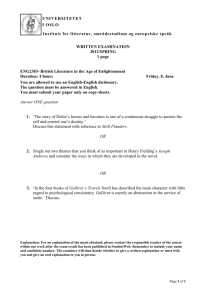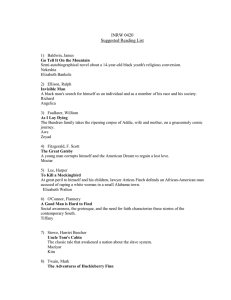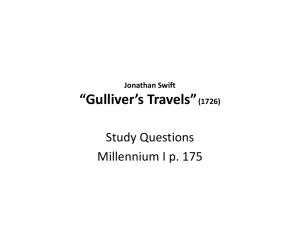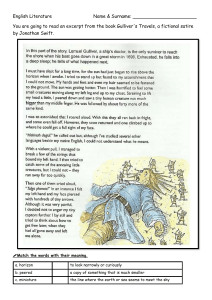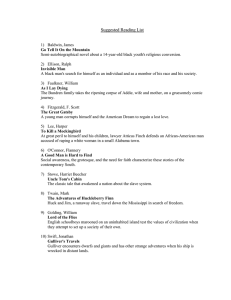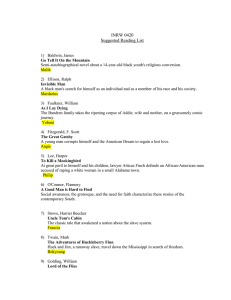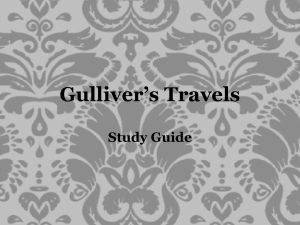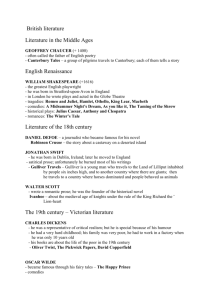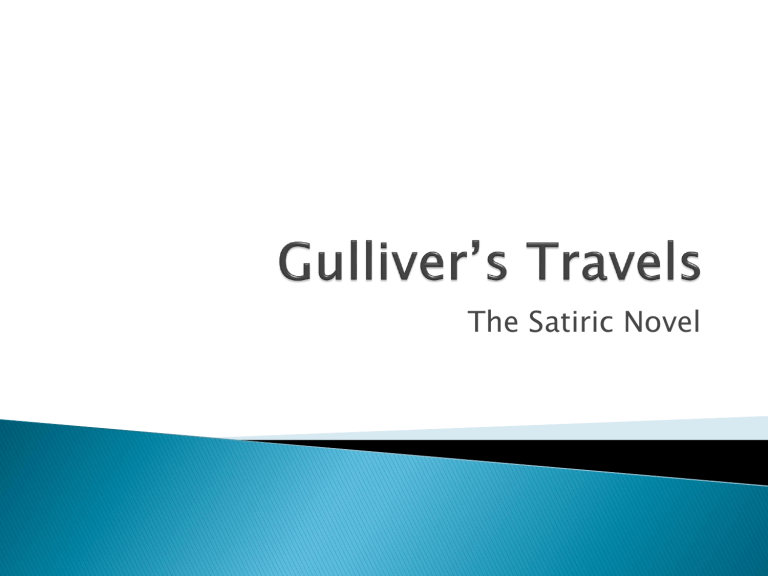
The Satiric Novel The features of Menippean Satire What is being satirised in this novel Robinson Crusoe and Gulliver’s Travels Man vs Society theme What is it to be human? Anglo-Irish Allegory Tell all the truth but tell it slant —/Success in Circuit lies/Too bright for our infirm Delight/The Truth's superb surprise/As Lightning to the Children eased/With explanation kind/The Truth must dazzle gradually/Or every man be blind — (Emily Dickinson) Named after Menippus (3 C BC) Written in prose Length of a novel Critique of inherited myths Uses parody and burlesque General targets of the satire are types of people and mindsets. Both novels concern voyages to strange lands Both works protest their true-to-life origins Robinson Crusoe is more realistic Defoe believes that man precedes society Swift is more pessimistic about human progress Man made worlds are criticised in Gulliver Gulliver’s Travels can hardly be labelled a novel at all, even at a time when the novel form is quite nebulous. The book lacks an overall unifying narrative force and whatever unity it possesses does not revolve around the development of character. Lemuel Gulliver learns nothing from his adventures….[T]he fictional world of Gulliver’s Travels is very much concerned with exterior realities (Derek Hand, A History of the Irish Novel, Oxford: Oxford UP, 2011, P. 34) Part 1: Lilliputians, six inches high, their feuds and wars absurd Part 2: Brobdingnag, whose king remarks: “I cannot but conclude the bulk of your natives to be the most pernicious race of little odious vermin that nature ever suffered to crawl upon the surface of the earth” His present Majesty’s grandfather, while he was a boy, going to eat an egg, and breaking it according to the ancient practice, happened to cut one of his fingers. Whereupon the Emperor his father published an edict, commanding all his subjects, upon great penalties, to break the smaller end of their eggs (2512). If the person accused makes his innocence plainly to appear during his trial, the accuser is immediately put to an ignominious death (2517). I hope the reader will excuse me for dwelling on these and the like particulars, which however insignificant they may appear to grovelling and vulgar minds, yet will certainly help a philosopher to enlarge his thoughts and imagination….wherein I have been chiefly studious of truth, without affecting any ornaments of learning or of style (2538). “As for yourself”, continued the King, “who have spent the greatest part of your life in travelling, I am well disposed to hope you may hitherto have escaped the many vices of your country….I cannot but conclude the bulk of your natives to be the most pernicious race of little odious vermin that nature ever suffered to crawl upon the surface of the earth” (2562) As I was on the road, observing the littleness of the houses, the trees. The cattle, and the people, I began to think myself in Lilliput, I was afraid of trampling on every traveller I met (2573). The Flying Island of Laputa, and its neighbouring continent, with its capital Lagado. Satire on philosophers, scientists, historians, and projectors. Flappers needed. Sunbeams from cucumbers, etc. Island of Sorcerors, the lies of history The Struldbruggs, miserable immortals It seems, the minds of these people are so taken up with intense speculations, that they neither can speak, or attend to the discourse of others, without being roused by some3 external taction upon the organs of speech…for which reason those who can afford to do so keep a flapper (2574). Their houses were very ill built, the walls bevil, without one right angle in any apartment; and this defect ariseth from the contempt they bear for practical geometry; which they despise as vulgar and mechanic, those instructions they give being too refined for the intellectuals of their workmen; which occasions perpetual mistakes (2576). [A] scheme for entirely abolishing all words whatsoever, and this was urged as a great advantage in point of health as well as brevity. For it is plain, that every word we speak is in some degree a diminution of our lungs by corrosion….An expedient was therefore offered, that since words are only names for things, it would be more convenient for all men to carry about them such things as were necessary to express the particular business they were to discourse on (2580) If a struldbrugg happens to marry one of his own kind, the marriage is dissolved of course, by the courtesy of the kingdom, as soon as the younger of the two comes to be fourscore. For the law thinks it a reasonable indulgence, that those who are condemned without any fault of their own to a perpetual continuance in the world, should not have their misery doubled by the load of a wife (2585). The reader will easily believe, that from what I have heard and seen, my keen appetite for perpetuity of life was much abated. I grew heartily ashamed of the pleasing visions I had formed,and thought no tyrant could invent a death into which I would not run with pleasure from such a life (2586). Yahoos: THEY ARE US Houyhnhnms, reasonable horses. Disdain for human stupidity The absurdity of war Misanthropy? Their heads and breasts were covered with a thick black hair, some frizzled and others lank; they had beards like goats, and a long ridge of hair down their backs (2588). Upon the whole, the behaviour of these animals was so orderly and rational, so acute and judicious, that I at last concluded, they must needs be magicians (2590). The very existence of the Yahoos…poses immense questions for the Houyhnhms, whose politics are now so consensual that they have but one remaining debate: whether or not to exterminate the brutes [paraphrase of Joseph Conrad’s Heart of Darkness ]. If they do that, of course, they may abolish the very grounds of their own being, for without the colonized, the colonizer is a nobody…The Yahoos are both intolerable and indispensable, a little like the Catholic Irish under the Penal Laws (Declan Kiberd, Irish Classics, London: Granta Books, 2000, 98). He [the master] was convinced (as he afterwards told me) that I must be a Yahoo, but my teachableness, civility, and cleanliness astonished him; which were qualities so opposite to these animals (2595). He added that he had heard too much upon the subject of war, both in this and some former discourses. There was another point which a little perplexed him at present….[T]hat the law that is supposed to be for every man’s preservation could be any man’s ruin (2603). I began last week to permit my wife to sit at dinner with me, at the farthest end of a long table; and to answer (but with the utmost brevity) the few questions I ask her. Yet the smell of Yahoo continuing very offensive, I always keep my nose well stopped with rue….I have to make the society of an English Yahoo by any means not insupportable, and therefore I here entreat those who have any tincture of this absurd vice [pride] that they will not presume to appear in my sight (2633). Big—small Optimist—misanthrope Human—savage Sane—insanity Shift in psychological perspectives Man is least himself when he is being sincere but give a man a mask and he’ll tell you the truth Oscar Wilde (The Critic as Artist). Gulliver's story, too, conflates the power of language with the language of power. Acts of interpretation within Gulliver's Travels-acts of creating and of reading, of inventing characters and of becoming characters in the fictions of others-signal both the text's complex relations to truth and its readers' unceasing stratagems for gaining power over its meaning (Richard H.. Rodino ““Splendide Mendax": Authors, Characters, and Readers in Gulliver's Travels”. PMLA 106.5 (1991), 1056). Is Gulliver a hero in this novel? What critique of the Enlightenment is being offered? What insight into human nature is provided? Does Gulliver change as a character? How is the ending unusual? Is Gulliver a reliable narrator? Barry, Kevin. “Exclusion and Inclusion in Swift's “Gulliver's Travels"”. The Irish Review (1986-) 30 (2003): 36–47. Web... Bentman, Raymond. “Satiric Structure and Tone in the Conclusion of Gulliver's Travels”. Studies in English Literature, 1500-1900 11.3 (1971): 535– 548. Web... Downie, J. A.. “Political Characterization in ‘Gulliver's Travels'”. The Yearbook of English Studies 7 (1977): 108–120. Web... Halewood, William H.. “Gulliver's Travels I, Vi”. ELH 33.4 (1966): 422–433. Web...
